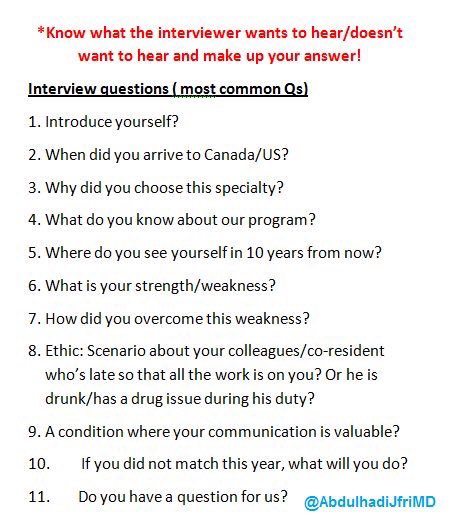What the Interviewer Wants to Know
The interviewer wants to know your qualifications and why you are the ideal candidate for the position. In today’s competitive job market, employers are looking for candidates who stand out and possess the right skills and experience to thrive in the role.
This is where the interview comes in. It is an opportunity for the employer to dig deeper into your background and determine if you are the best fit for the job. We will explore what the interviewer wants to know during the interview process and how you can effectively demonstrate your qualifications.
By understanding the interviewer’s perspective and preparing accordingly, you can increase your chances of acing the interview and securing the job offer. So let’s dive in and uncover the key areas the interviewer is interested in!
1. Skills And Qualifications
During a job interview, the interviewer wants to assess your skills and qualifications to determine if you are the right fit for the role. This section will delve into two important aspects that employers often consider: relevant experience and education and training.
1.1 Relevant Experience
Relevant experience is one of the primary factors interviewers consider when evaluating candidates. They want to know if you have successfully performed similar tasks or responsibilities in your previous roles. By understanding your past experiences, they can gauge if you have developed the necessary skills and knowledge required to excel in the position.
The interviewer may ask specific questions about the projects you have worked on, the challenges you have faced, and the outcomes you have achieved. It is crucial to highlight your accomplishments and provide concrete examples that demonstrate how your experience aligns with the requirements of the role.
To effectively communicate your relevant experience, make sure to:
- Showcase your achievements with quantifiable results, such as increased sales by 20% or reduced costs by $50,000.
- Highlight any specific skills or expertise gained through your previous work that directly relate to the job you are applying for.
- Discuss how your experience has prepared you to handle the challenges and responsibilities of the position.
1.2 Education And Training
Education and training play a vital role in determining the suitability of a candidate. Interviewers want to know if you possess the necessary educational qualifications or if you have pursued additional training relevant to the job. Your educational background can help them assess your theoretical knowledge, while any certifications or specialized courses highlight your commitment to professional growth.
While discussing your education and training, be sure to:
- Provide details about your degree, institution, and any relevant coursework or academic projects that demonstrate your competency.
- Highlight any certifications, licenses, or professional training you have obtained that are directly related to the role.
- Explain how your educational background or training has equipped you with the skills and knowledge necessary for the position.
Remember, interviewers are seeking to understand how your skills and qualifications make you the ideal candidate for the job. Clearly showcasing your relevant experience and education will help you stand out from other applicants and increase your chances of securing the position.
2. Work Ethics And Attitude
A candidate’s work ethics and attitude are important to interviewers as they provide insights into their character and how they approach their work. Interviewers want to know if you are dedicated, reliable and have a positive attitude towards challenges.
During a job interview, employers not only want to assess your technical skills and qualifications but also gain insight into your work ethics and attitude. This helps them determine if you’ll be a good fit within their organization and if you possess the right mindset to contribute to their team’s success. Two significant aspects they focus on are your problem-solving skills and your ability to collaborate in a team setting.
2.1 Problem-solving Skills
Employers value candidates who can think critically and solve problems efficiently. They want to know if you possess the ability to analyze a situation, identify the root cause of a problem, and propose effective solutions. Demonstrating strong problem-solving skills indicates that you can handle challenges, make sound decisions, and contribute to the company’s growth.
During the interview, the interviewer may ask you hypothetical questions related to problem-solving. These questions are designed to assess your creativity, logical thinking, and ability to handle pressure. It is essential to provide clear and concise examples from your past experiences that highlight your problem-solving abilities.
2.2 Teamwork And Collaboration
Collaboration is an essential component of workplace success. Employers want to know if you can effectively work as part of a team, communicate your ideas, and build positive relationships with colleagues. A good team player is reliable, supportive, and respectful towards others’ opinions and contributions.
In an interview, the hiring manager may ask questions to evaluate your teamwork and collaboration skills. They might inquire about successful team projects you’ve worked on, your role in those projects, and the challenges you encountered while collaborating with others. It is crucial to provide specific examples that highlight your ability to work well in a team environment and achieve shared goals.
3. Motivation And Passion
Motivation and passion reveal the candidate’s drive and commitment. Interviewers want to understand what motivates the candidate and if they possess genuine passion for the job, which indicates future success.
When it comes to assessing candidates during an interview, one crucial aspect interviewers focus on is the candidate’s motivation and passion. Understanding a candidate’s drive to succeed and their genuine interest in the role and the company can help employers determine whether the candidate is the right fit for the organization. There are two key areas interviewers explore when evaluating a candidate’s motivation and passion: their career goals and their interest in the company. Let’s delve into each of these areas in more detail.3.1 Career Goals
Interviewers want to gauge your career aspirations and determine if they align with the position and the company’s long-term goals. By exploring your career goals, interviewers can assess whether you have a clear direction and if the position you’re applying for will contribute to your professional growth. To effectively showcase your career goals during an interview, keep the following points in mind: 1. Highlight your long-term aspirations: Communicate your vision for the future and how this role can be a stepping stone to achieving your goals. This demonstrates ambition and a desire for continuous improvement. 2. Show relevancy: Clearly articulate how your career goals align with the organization’s industry or sector. Emphasize how your skills and passion are a perfect fit for the company and the position you are interviewing for. 3. Demonstrate adaptability: Highlight your willingness to adapt and take on new challenges to achieve your career goals. Flexible individuals who are open to learning tend to be highly valued by employers. Remember, being authentic and genuine in expressing your career goals will help interviewers assess your motivation and alignment with the company.3.2 Interest In The Company
Beyond your career goals, interviewers are interested in understanding your level of interest in the company. They want to know if you’ve done your research and if you genuinely see yourself as a good fit within the organization. To showcase your interest in the company effectively, consider the following tips: 1. Research, research, research: Thoroughly investigate the company’s background, culture, values, and recent achievements. This knowledge will help you tailor your responses to demonstrate that you are well-informed and genuinely passionate about the company. 2. Connect your skills to the company’s needs: Display a clear understanding of how your skills and experiences align with the company’s objectives. Emphasize how your unique strengths can contribute to the company’s success. 3. Express enthusiasm: Clearly convey your excitement about the opportunity to work for the company. Showcase your enthusiasm by discussing specific aspects of the company’s work, projects, or values that resonate with you. By effectively communicating your interest in the company, you can demonstrate your motivation and passion, making you a more appealing candidate in the eyes of interviewers. Remember to be genuine and specific in conveying your enthusiasm and connection to the organization.
Credit: www.zippia.com
4. Cultural Fit
During a job interview, the interviewer is not only trying to assess your qualifications and skills, but also evaluating whether you will be a good fit for their company’s culture. Cultural fit is an important factor for employers because hiring individuals who align with their values and can adapt to the company’s environment can lead to higher employee satisfaction and productivity. There are various aspects of cultural fit that interviewers explore, including company values and adaptability. Let’s delve deeper into each of these.
4.1 Company Values
One aspect of cultural fit that interviewers are keen on evaluating is how well your values align with those of the company. Employers want to determine whether you share common beliefs and principles, as this helps create a cohesive and harmonious work environment. To assess this, interviewers may ask questions about your personal values and how they relate to the company’s values.
For example, if a company values teamwork and collaboration, they might inquire about instances where you have worked successfully in a team and how you contributed to its success. Furthermore, they may query your approach to handling conflict and whether you prioritize the team’s objectives over personal achievements.
In addition to direct questions, you can also gain insights about a company’s values from their website or social media presence. This allows you to tailor your responses during the interview specifically to highlight your alignment with those values, ultimately increasing your chances of being perceived as a good cultural fit.
4.2 Adaptability And Flexibility
Adaptability and flexibility are traits highly sought after by employers, as they indicate your ability to thrive in the ever-evolving business landscape. Companies value individuals who can quickly adjust to new situations, embrace change, and handle challenges with ease. In this regard, interviewers may ask questions to gauge your adaptability and flexibility.
They might ask about instances where you had to learn a new skill or process quickly or how you managed changing priorities and deadlines. Additionally, they may inquire about your ability to work effectively in a fast-paced and dynamic environment.
Demonstrating adaptability and flexibility extends beyond your responses. Your body language and demeanor throughout the interview can also indicate these qualities. Maintain an open and positive attitude, and be receptive to any unexpected twists or turns during the conversation. This showcases your ability to handle unforeseen circumstances with grace and composure.
5. Communication And Interpersonal Skills
During an interview, employers are not only interested in your technical expertise but also how well you can communicate and interact with others. Strong communication and interpersonal skills are crucial in any workplace, as they contribute to effective collaboration, problem-solving, and relationship-building. By assessing your communication and interpersonal skills, the interviewer can gauge your ability to communicate ideas, listen actively, and work well with colleagues, clients, and stakeholders.
5.1 Effective Verbal Communication
Effective verbal communication involves expressing ideas clearly and concisely, utilizing appropriate language for different audiences and situations. Employers want to determine if you can convey your thoughts in a compelling manner, ensuring that your message is understood and well-received by others. Additionally, they will assess if you can articulate complex concepts in a simple and straightforward manner.
During the interview, pay attention to your word choice, tone, and body language. Be confident in your speech, speak in a professional manner, and avoid using jargon or technical terms that might confuse the interviewer. Make sure to answer questions with clarity, maintaining a positive and engaging attitude. Remember, effective verbal communication can help build rapport, establish trust, and foster effective teamwork.
5.2 Active Listening
Active listening is an essential skill that interviewers seek in candidates. It entails fully focusing on the speaker, comprehending the message, and responding appropriately. Active listening shows the interviewer that you value their opinions, respect their input, and are committed to understanding their needs. It also demonstrates your ability to follow instructions and gather relevant information.
During the interview, practice active listening by maintaining eye contact, nodding in agreement, and asking clarifying questions. Show genuine interest in what the interviewer is saying, and avoid interrupting or jumping to conclusions. Remember, active listening is not just hearing the words spoken; it’s understanding the underlying meaning, acknowledging emotions, and responding effectively.
:max_bytes(150000):strip_icc()/job-interview-question-what-motivates-you-2061272-edit-75a91be8fe84400a9acf0fd0949bae23.jpg)
Credit: www.thebalancemoney.com

Credit: twitter.com
Frequently Asked Questions For What The Interviewer Wants To Know
What Does The Interviewer Want?
The interviewer wants to assess your qualifications and suitability for the job. They are looking for someone who meets their criteria, such as skills, experience, and cultural fit. It’s important to showcase your abilities and effectively communicate how you can contribute to the company’s success.
What Do Interviewers Need To Know?
Interviewers need to know relevant information about you, such as your skills, experience, and qualifications. They also need to understand your motivation for the job, as well as your ability to work well within a team. Additionally, they may ask situational or behavioral questions to gauge your problem-solving and communication skills.
Ensure you present yourself professionally and confidently during the interview process.
What Every Interviewer Wants To Hear?
Every interviewer wants to hear candidates who are confident, knowledgeable, and a good fit for the role. They expect clear communication, relevant experience, and a positive attitude. Demonstrating strong problem-solving and teamwork skills will make you stand out. Show enthusiasm, a willingness to learn, and a genuine interest in the company.
Conclusion
To summarize, understanding what interviewers want to know is crucial in preparing for a successful job interview. By focusing on their potential concerns and emphasizing relevant skills and experiences, candidates can effectively communicate their suitability for the position. Remember to carefully research the company and tailor responses to align with their values and goals.
Being confident, concise, and genuine will leave a lasting impression on the interviewer.


